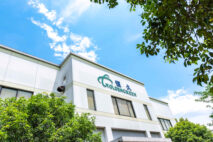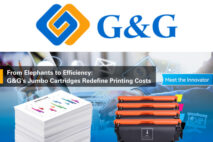Apex Microelectronics Company of Zhuhai, China, and Sanford, NC-based Static Control Components jointly announced “a strategic merger of the two companies” on May 7. Not many details were provided in the joint press release, which ran approximately 250 words, but the message was clear: The two largest suppliers of components to the international remanufacturing industry are now one and the global market for ink and toner cartridge parts will be dominated by a newly combined behemoth.
Neither company disclosed the terms of the Apex acquisition but reports out of Asia shed some light on the deal. The Recycler issued an email blast quoting a Reuters report that said “Static Control Components has been sold to Apex in a $63 million cash deal.” In addition, I was able to learn a little about the new partners’ finances. Apex is listed on the Shenzhen Stock Exchange under the name Apex Technology (stock code 002180). As a result, certain information about the firm’s earnings is available. During the fiscal year ending December 31, 2014, Bloomberg Business reported Apex’s revenue totaled RMB478.1 million or about $77 million. According to a translated post that appeared on the Chinese-language site www.cnstock.com, Static Control’s total revenue in 2014 was approximately $194 million down about 18 percent from sales of $237 million in 2013. I should point out that because Apex is a public company, Bloomberg’s numbers were presumably audited while it is not clear what level of scrutiny was paid to www.cnstock.com’s report.
I’ve Heard That One Before
Rumors of a Static Control acquisition have circulated for at least a decade and most were easily to dismiss. The alleged suitors ranged from the plausible to the ridiculous, so we never wrote about all the chin-wagging on the Actionable Intelligence website. But the scuttlebutt about an impending sale of the U.S.-based components manufacturer gained credibility over the past couple years. As the remanufacturing industry in the West has consolidated, Static Control, along with many of its competitors, lost more and more customers and sales have declined. The travails of Western component vendors have been well documented. U.S. remanufacturing suppliers like Imaging Resources and Oasis Imaging have shuttered their operations. Static Control’s two largest rivals in the United States, Future Graphics and UniNet Imaging, have also exhibited signs recently of trying to grow in a weak market. Future Graphics has shed a number of jobs over the past 12 months, while UniNet began marketing label printers and supplies this year in hopes of shoring up sagging component sales. Likewise, we’ve have heard reports out of Sanford that Static Control has trimmed its payroll.
I expect that the Apex/Static Control merger will provide welcome stability for each company and allow the firms to operate more efficiently worldwide. Apex will strengthen its position in the Americas especially in the United States, while Static Control’s place in emerging markets will be buttressed. By joining forces, the two firms will also be able to more fully leverage their technical know-how as well as add to their already considerable research and development capabilities. According to the joint press release issued by Apex and Static Control, the pair expects to be able to achieve “increased speed to market, higher service levels, and stronger commitment to further expanding opportunities for the imaging aftermarket.”
Since news of the acquisition broke, lots of questions have come in Actionable Intelligence and many are simply impossible to answer at such an early date. It remains unclear, for example, what shape the final combined company will take. The two have said they will maintain “independent operations,” but there was no indication of what the final organizational chart will look like. I expect that Static Control’s senior management team will remain intact and assist their new Chinese partners as they navigate the choppy waters in so many Western markets—but for how long, who knows? We should gain new insights into the performance of the newly merged firms by monitoring Apex Technology (002180) on the Shenzhen Stock Exchange. Curiously, when I checked the exchange’s English site to gauge how investors reacted to news of the merger, no share pricing data was available for the firm after October 31, 2014.
A Study in Opposites
Although their product lines are similar, Apex and Static Control are distinctly dissimilar. In addition to the obvious East-West thing, the companies were formed and grew quite differently. Static Control was founded in the 1990s when the U.S. remanufacturing industry was in its infancy, while Apex was established in 2004 to support what was then an exploding Chinese third-party supplies industry. Launched before chips were common fixtures on virtually every ink and toner cartridge, Static Control initially only sold toners, drums, and parts such as blades and rollers. Chips were added several years later and grew to be a critical product line for the firm. Apex, on the other hand, was founded as a chip manufacturer and added other components to its portfolio as time went along. The corporate structure of the two companies is also different. Until the merger, Static Control was a closely held corporation, while shares in Apex are traded publically in China, as I noted earlier.
Perhaps the most profound difference between the newlyweds has been their approach to supporting the global third-party supplies industry. As cheap, compatible ink and toner cartridges, which often violate patents and other intellectual property, began to adversely affect the remanufacturing industries in Western markets, Static Control embraced a “no clones” policy. The firm vowed to sell its products exclusively to companies that remanufacture cartridges and said it would stop selling components to companies that manufactured new-build compatibles. Apex, on the other hand, observed no such prohibition. In fact, in the Recycling Times’s pro-compatible whitepaper “Getting Rid of the ‘Clone,’ ” which was published last year, the Chinese reman magazine praised Apex for its policy of marketing chips to “remanufacturers and new-built cartridge producers alike.”
For its part, Static Control has indirectly chided Apex for marketing what were claimed to be infringing chips. The Zhuhai-based company was named as a defendant in a lawsuit filed by HP last year; the complaint alleged that Apex along with Ninestar affiliates had violated certain chip and cartridge patents (see “HP Sues Ninestar and Apex Micro for Patent Infringement”). Static Control promptly applauded the OEM’s move (see “Ninestar Issues Statement on HP Lawsuit, Static Chimes In“). Although Apex was not mentioned by name, Static Control’s inference was clear when it said, “We are pleased to see the continuous actions of the OEMs protecting their IP.” Static Control opined that “low-cost, illegitimate ‘copycat’ cartridges are bad for the environment, eat away at market share, and erode margins.” The firm went on to reiterate its pledge to sell only to remanufacturers and said it refused “to sell to clone/copycat manufacturers and have remained vigilant in our pro-IP stance.” Perhaps coincidentally, perhaps not, HP’s lawsuit against Apex and Ninestar was resolved shortly before news of the Static/Apex merger broker (see “HP Ends Patent-Infringement Complaint against Ninestar and Apex“).
So, What About Ninestar?
Given its outspoken anti-clone position, I wonder what the future relationship will be between Static Control and Ninestar, one of the world’s largest third-party supplies vendors that, like Apex, is based in Zhuhai. The company markets ink and toner consumables worldwide under the G&G brand as well as others. Questioning the Ninestar/Static Control relationship seems appropriate because there’s some inexplicable link between the two Zhuhai-based firms and, after being sued by Canon, Epson, HP, and Lexmark, Ninestar has developed a reputation for marketing infringing cartridges. In several instances, OEMs proved that the Chinese company was marketing infringing, newly manufactured compatibles—a.k.a. clones. So, is it time for Static Control to rethink its no-clone policy?
After all these years, I admit that I’m still not quite sure what the “official” connection is between Apex and Ninestar, but there is some linkage for sure. I first visited China about 10 years ago and had the privilege of getting to know some of Ninestar’s senior management team including the company’s founder Dongying Wang, who is also known by his English name, Jackson Wang. Over the next few years, I attended various Chinese trade shows and always visited the Ninestar and Apex stands, which were hosted separately. During these visits, I noticed that certain personal would alternately staff the two booths. At one show, I’d see some folks working in the Apex booth whom I had met previously in the Ninestar booth, and at the next show they’d no longer be in the Apex booth, but rather back at Ninestar’s booth. Eventually the mystery was solved, at least partially. When I met the head of Apex, Mr. Wang’s brother Dongjie, who also goes by the English name Jason Wang, it was explained to me that Apex and Ninestar are “sister companies.”
My uncertainty over the relationship between Apex and Ninestar lingers to this day. I’ve never been able to accurately define what is meant by “sister companies” in any material sense such as in terms of ownership, management, or operations. Thanks to the Bloomberg site mentioned earlier, I do know that both Wang brothers sit on the Apex board and Dongjie is the director of the board as well as the general manager of the company. In addition to being run by brothers, the firms often share assets such as legal representation and occasionally personnel. Beyond that, I can offer little additional insight into the connection between the two firms.
There are good reasons why any connections between Apex and Ninestar are significant when pondering Static Control’s future. The first is fairly basic: As I questioned earlier, given Ninestar’s track record as a habitual infringer, will Static Control be forced to retract its vow not to support clonemakers? It seems unlikely that Ninestar will not eventually gain access to the products and technologies acquired at great expense by its sister company. One should also consider what impact any Static Control/Ninestar connection might have on the component-maker’s customer base. Will remanufacturers rethink using Static Control as a supplier because of its affiliation with Apex and by extension with Ninestar? Maybe. Companies have told me in the past that they will not purchase supplies from their competitors, but I’ll get back to that later. And Apex’s chip business could be at risk, too. I understand that some of Static Control’s biggest competitors source their chips from Apex.
Another point to consider is whether access to Static Control’s substantial production assets in Sanford, NC, will enhance Apex and Ninestar’s U.S. manufacturing capacity. After hearing for several months that Static Control is remanufacturing toner cartridges, we recently learned that SKUs are being marketed under its name in Hong Kong (see “Static Control-Branded Remanufactured Cartridges Hit the Market“). If Static Control has taken up remanufacturing and now Ninestar can leverage those assets, what would it mean to U.S. remanufacturers? Ninestar is among the top-five largest third-party supplies vendors in the world. I suspect that all remans doing business in the United States will feel a bit queasy if they contemplate the prospect of a competitor with the might of Ninestar fully integrated with Static Control and setting up shop in the United States.
A Few More Questions
Of course, remanufacturers will not be the only ones wondering what their relationship with Static Control and its new partner will be going forward. I suspect that the OEMs will be closely monitoring the situation as well. Certain hardware manufacturers have come to hold Static Control in high regard, thanks to its ongoing support for the rights of intellectual property holders and its respect of OEM patents. Various OEMs including HP and Lexmark routinely participate at Static Control-sponsored events. And Static Control’s suppliers have included Ricoh and Xerox. Will the perception of Static Control be lower in the eyes of hardware manufacturers when they learn of its new relationship with Apex?
The flip side to my suggestion of any OEM hand-wringing may well be that Apex is able to parlay its acquisition of Static Control to forge new alliances with hardware manufacturers. Perhaps that has already begun. As noted previously, just hours before news of the acquisition broke, HP announced that it had dismissed a suit filed against Apex and Ninestar and a settlement had been reached (see “HP Ends Patent-Infringement Complaint against Ninestar and Apex”). Filed last October, the case seems to have been resolved in record time and, in the end, the attorney representing the two Chinese companies said his clients were “very pleased that they were able to negotiate amicably with HP and resolve the matter.” Was this amicable resolution somehow the result of the merger?
I realize that one settlement doesn’t represent a trend, but could it be a signal that when firms face patents issues in the future, they’ll be more willing to negotiate rather than litigate? Dare I suggest that the merger could calm the hostilities between OEMs and the reman industry? Well, at the very least, a combined Apex-Static Control company makes a very big and conspicuous target for OEMs should massive amounts of infringing chips begin circulating. No doubt, the OEMs will welcome having only one throat to choke and the fact that there is a large U.S. campus where any legal documents can be served.
Not to be too much of a Pollyanna, but the merger of Apex and Static Control may force the supplies industry as a whole to “come together.” Earlier, I posited the notion that Apex and Static Control’s customers may spurn the pair for competitive reasons. Well, maybe, but there’s evidence to suggest that after any initial misgivings, customers will return. Many U.S. remanufacturers vowed in 2010 they’d never (ever!) purchase cores from ERS, the region’s largest empties broker, after the world’s largest remanufacturer, Clover Technologies, acquired it. But as empties availability dried up and Clover purchased the region’s number-two broker, Office Products Recycling Associates (OPRA), remanufacturers returned. They realized that if they wanted cores originally sold in the United States, an important consideration to stay on the right side of U.S. patent law, and they wanted them with some degree of reliability and in volume, they’d have to go to Clover. Today, the enormous remanufacturer generates tens of millions of dollars annually selling it empties to U.S. remanufacturers that are grateful to have Clover as their supplier regardless if their gratitude is a bit “nuanced.”
Keep the Clover scenario in mind as you watch Static Control and Apex (along with Ninestar) come together over the ensuing months. There will be lots of howls and gnashing of teeth, but when the dust settles, the industry will continue to source its chips and other parts from the combined firms. Of course, the merger does open doors for smaller component vendors and chip manufacturers like Chips Inc. in the U.S. and the Chinese chipmaker Guangzhou Zhono Electronic Technology. I’m sure these firms and others like them were delighted to hear the news of the merger. In the long run, however, Apex is the industry’s 800-pound gorilla and by acquiring Static Control it now controls the vast majority of the market. Regardless of how remanufacturers and chip and component vendors may feel, there is really no other place to go to purchase all the stuff that Apex can provide—period, the end. Wonder how well Apex will do with Static Control? Ask Clover how well its empties business is doing.







1 Comment
Lovely editorial Charlie.
Very comprehensive.